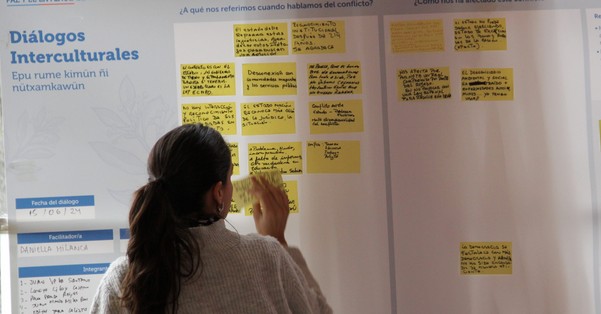- In the capital of the Los Ríos Region, this series of meetings continued, lasting until the end of August, where attendees reflected and proposed ideas for improving the relationship between the State and the Mapuche people.
Over a hundred people—according to preliminary figures—from various communes and localities participated in the fifth Intercultural Dialogue organized by the Presidential Commission for Peace and Understanding. The event took place this Saturday at the Instituto Comercial de Valdivia, in the capital of the Los Ríos Region.
Attendees came from Panguipulli, Lanco, Mariquina, Paillaco, Futrono, Río Bueno, and La Unión, as well as other areas like Puerto Montt and Teodoro Schmidt.
This event is part of a series of meetings organized by the Commission to fulfill its goal of facilitating a dialogue process that leads to consensus and legitimizes the measures to be recommended to the President of the Republic.
As in the other Intercultural Dialogues held so far, participants reflected, debated, and proposed solutions regarding the territorial conflict between the Biobío and Los Lagos regions. At the start of the session, they were welcomed in a plenary by Commissioner Emilia Nuyado, Commissioner Sebastián Naveillán, and the Commission’s Executive Secretary, Víctor Ramos.
Later, attendees split into 14 discussion and working groups, where they reflected and engaged in dialogue with people of differing views, proposing their ideas for solutions to the issues addressed by the Commission. This phase was conducted with the help of facilitators and a methodology developed in collaboration with the platform Tenemos Que Hablar de Chile.
These spaces differ from formal hearings, where the entire Commission receives individuals and groups—events that have been and will continue to be held in the four regions.
After the dialogue in the 14 groups, attendees shared their experiences in a plenary session.
Regarding the fifth Intercultural Dialogue, the Commission’s Executive Secretary, Víctor Ramos, stated, "We’ve had extraordinary attendance. Mapuche communities and leaders, civil society, business associations, and victims are all present. We gather in this space to exchange perspectives on a common horizon, a future where the problems we’ve carried for decades can be resolved—one of the Commission’s fundamental mandates."
Commissioner Sebastián Naveillán emphasized the importance of "listening to all sectors, who might not have otherwise come together to discuss solutions to such a long-standing conflict." He added, "As commissioners, we will always strive to look toward the future of all regions the President asked us to observe, so that in November, we can deliver solutions and proposals incorporating ideas from citizens across the four regions."
Self-Organized Meetings Also Available
One attendee, Pía Chavarría, werken of the lof Calfuñao, shared after the session: "At least in our group, it was very productive. There were good reflections, good analysis, and ultimately, everything boils down to the main problem—and also the main solution—being recognition of us as the Mapuche nation-people. From there, we can move forward, addressing the restitution of our territories and creating mechanisms to restore our culture, reclaiming the dignity of our Mapuche way of life."
Another attendee, Marcela Wulf, Sub-Manager of Public Affairs at Arauco, Los Ríos Region, said: "This space for dialogue and understanding in Valdivia today is essential to making progress in this conflict, finding agreement mechanisms that truly allow us to build a better country where we can coexist more harmoniously."
Another way to propose ideas to the Commission is through Self-Organized Meetings. These are designed for the Mapuche people and civil society to create, according to their own organizational methods, internal deliberation spaces to present initiatives to the Commission.







Comments (0)
No comments yet. Be the first to comment!
Leave a comment